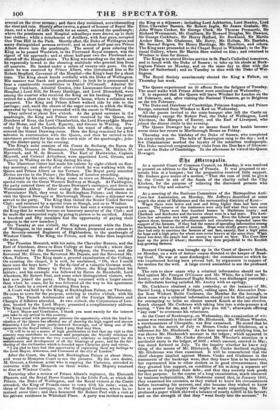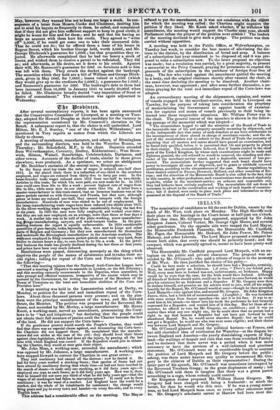Tr.rbe _Metropolis.
At a special Court of Common Council, on Monday, it was resolved to present an address to the King of Prussia. It was proposed to en- tertain him at a banquet ; but the proposition received little support. Mr. Godson gave notice of a motion, "That the sum of 5001. be givt by the Court in aid of the funds of the charity called the City Kitchen, for the purpose of relieving the distressed persons who throng the City and suburbs."
At a meeting of the Business Committee of the Metropolitan Anti- Corn-law Association, on Monday, Mr. Jeffreys described at some length the state of Maidstone and the surrounding districts of Kent— Wages there were lower and rent and firing higher than bad been ever known. The returns of the tradesmen were only half what they were some years ago. There were four hundred houses in Maidstone empty ; and Chatham and Rochester and the towns about were in a had state. The Anti- Corn-law advocates met with great opposition. Even the Liberal press was. against them, because the advertisements and circulation depended upon the support of the farmers. If they had the means of spreading information among the farmers, he had no doubt of success. Hops were chiefly grown there; and. they had only to convince the farmers of one fact, namely, that a high/ price for hops and a high price for wheat were never known at the same time. W4en bread was dear, the people had no money to spend on beer. The Corn-biws kept up the price of wheat ; therefore they were prejudicial to the Kentish hop-growing farmers.
Bernard Cavanagh was brought up in the Court of Queen's Bench, on Monday, on a writ of habeas corpus directed to the keeper of Read- ing Gaol. He was at once discharged; the commitment on which he was imprisoned having been proved bad, by arguments in support of the motion for the writ. A large crowd assembled to see the professed faster.
The rule to show cause why a criminal information should not be filed against Mr. Feargus O'Connor and Mr. White, for a libel on Mr. Ansley, one of the Masters of Rugby School, was discharged yesterday ; the defendants having satisfied Mr. Anstey with an apology.
Mr. Cockburn obtained a rule yesterday, at the instance of Mr. Daniel Long, a burgess of Bridport, calling upon Mr. Alexander Dun- das Ross 'Wishart Bailie Cochrane, the Member for the borough, to show cause why a criminal information should not be filed against him for attempting to bribe an elector named Keech at the late election. Keech charged Mr. Cochrane with taking him into a side-passage aid saying, "Vote for me, and I will give you 50/."; afterwards offering "any sum" to overcome his reluctance.
At the Court of Bankruptcy, on Wednesday, the examination of wit- nesses was resumed in the case of Mr. Hitchcock. Mr. William Wheeler, a warehouseman of Cheapside, was first examined. He stated that he applied in the month of July to Messrs. Cooke and Gladstone, as a reference for Mr. Hitchcock. As the best means of satisfying him, he was shown Mr. Hitchcock's account in the ledger; which appeared to be a very fair one. Mr. Cooke directed Mr. Wheeler's attention to a particular entry in the ledger, of 2001.; which amount, entered in May, was dated forward as July. To the inquiry whether he knew any thing of the means of Mr. Hitchcock, Mr. Cooke declined replying. Mr. Gladstone was then examined. It will be remembered that the chief charges implied against Messrs. Cooke and Gladstone in the statements of the bankrupt were, that they knew him to be insolvent, but represented him to other dealers as in good circumstances; that they granted him support, on condition of his making a separate arz rangement to liquidate their debt ; and that they secretly took goods for that purpose. In the course of a long examination, much obscured by business technicalities, Mr. Gladstone stated that, in January 1841, they examined his accounts, as they wished to know his circumstances before increasing his account, and also because they wished to know how to answer any inquiry that might be made respecting him. He produced a paper which showed a balance of nearly 4,000/. in his favour; and on the strength of that they "went freely into the account." In May, however, they warned him not to keep too large a stock. In con- sequence of a letter from Messrs. Cooke and Gladstone, desiring him not to send his buyers so frequently to them, he called, and complained that if they did not give him sufficient support to keep in good credit, it might be worse for him and for them ; and he said that his having so large an account with them hurt his credit. They agreed to "write off" 2,5004, if he could get some one to take their unsecured debt. That he could not do ; but he offered them a lease of his house in Regent Street, which his brother George held, worth 2,000/., and Mr. George Hitchcock's guarantee for 1,0001.; but that proposition they re- jected. He afterwards complained that he had too heavy a stock of linens, and wished them to receive a parcel to be refinished. They did so ; and afterwards, at his desire, set it down to his credit. Against their will, Mr. Buzzecott's guarantee for 500/. on furniture sold to him was left with them. They struck the docket against the bankrupt. The securities which they hold are a bill of William and George Hitch- cock, given in May 1840, for 7,000l.; leases valued at 6,550/. (which they would give up to the creditors for 5,000/.); a guarantee for I,000/.; and Buzzecott's guarantee for 500/. The bankrupt's debt to them had been increased from 16,300/. in January 1841 to nearly 20,000/. when he failed. Mr. Gladstone broadly denied "any imputation of fraud or desire of concealment." The examination was again adjourned to Wednesday.



























 Previous page
Previous page